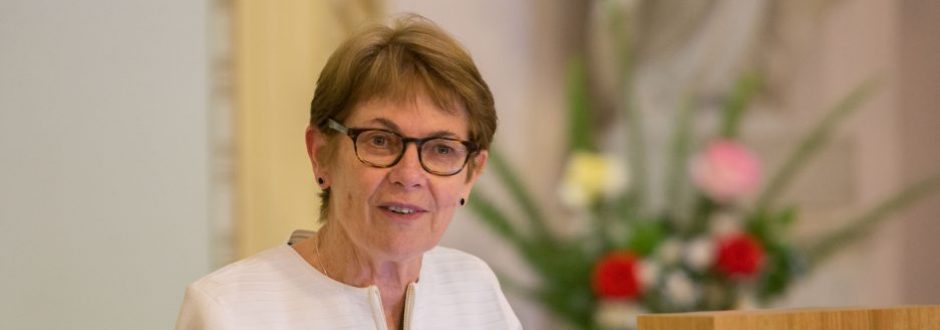For the sake of humanity and our planet, we cannot allow personally, communally, nationally or globally, to return to situation normal, writes Patty Fawkner.
It was early February 1984. The Grade 5 teacher came into the staff room harrumphing: “I’m trying to teach the kids about Lent and all they can talk about are last year’s fires”. I was the “newbie” Principal having arrived at the Port Fairy school in south western Victoria, a year after the 1983 Victorian and South Australian catastrophic Ash Wednesday fires. The Western District had been hit hard and the locals who’d lost stock and property were still finding their feet and sense of equilibrium.
I didn’t share the teacher’s frustration. It occurred to me then and now, that deadly fires and the season of Lent are inextricably linked.
“Lent” is an Old English word meaning Spring. In some languages it means forty and in the Philippines, it means precious great days. St Benedict offers some wisdom for how we might “celebrate” these precious great days.
For Benedict, Lent is a journey of conversion from sin to love. The Greek word for sin is hamartia, an archery term for missing the mark. As a country we have missed the mark. We have sinned in our individual and communal contribution to a warming planet which, despite political obfuscation, we cannot deny is a major contributing factor to the current devastation caused by drought, fire and now flood.
Ilia Delio, the Franciscan Sister theologian specialising in science and religion, describes sin as an individual rejecting the communion for which we are created. “Sin is the refusal to accept responsibility for those to whom we are connected,” be that a member of our family, community, a work colleague etc.
Not only do we sin when we disconnect from our human community. Pope Francis describes sin as “our wilful ignorance of the holiness of our planet, and for anything we do to hurt or diminish the planet in any way”. Francis is unequivocal. It is sinful to diminish the planet in any way.
For Benedict, Lent is a journey of conversion from negligence to observance and from evil habits to grace-filled efforts. It is a journey from less of in order for more of. We’re used to that. For years we’ve gone without treats during Lent to give more to those in need. This Lent, might not we be more observant of our carbon footprint and make even more grace-filled efforts to care for our wounded earth as we stand in solidarity with those impacted by the fires and floods?
If you’re like me, you approach Lent somewhat stoically, as though it’s a grim affair that one must endure – a bit like a long-haul flight in “cattle class”! Not so for Benedict who presents Lent as a journey of joy; he speaks more about joy in his chapter on Lent than anywhere else in the Rule.
Is it too naïve or even crass to speak about joy at this time of catastrophic loss and trauma? No, says Benedict. Deeply schooled in the Paschal Mystery, Benedict wishes us to find joy in the waiting for Easter and longing for new life to emerge from the ashes of our lives. Lent is a time of a joyful desire for God and a joyful desire for healing and comfort. A deep-seated joy is the flip side of the necessary lament that we must pray over these days.
I cannot magically conjure up joy. As wisdom figures know, joy needs to be tended. There are threads that we can tend and weave through our Lenten tapestry.
The first thread to live in joy is to live in the present and to pay attention to the now. Compunction is the curious word Benedict uses to describe our attitude during the season of Lent. It means to prick sharply. St John Cassian, one of Benedict’s principal sources, defines compunction as “whatever can by God’s grace waken our lukewarm and sleepy souls.”
“This definition seems to suggest that we live our spiritual life in a state of half-wakefulness,” says Cistercian scholar Michael Casey.
I believe that these fires and the subsequent floods have not only impacted our land, they have impacted our national psyche. Our conscience has been sharply pricked. A gift of these past months has been the grace of compunction – the transition to a state of fuller awareness.
For the sake of humanity and our planet, we cannot allow personally, communally, nationally or globally, to return to situation normal, nor can we accept what the politicians want us to accept, that these fires are “the new normal”. One would think that Australia would lead the way for action on climate change! One can but hope and pray.
Another thread in the tapestry of joy is practising gratitude. Being grateful is a shield against the corrosive tendency to scapegoat and play the blame game at this time.
Despite grief and despair during our bushfire hell, expressions of gratitude have been palpable. “We’re just thankful to be alive.” “I can’t thank my neighbours enough.” “The fireys are our national heroes.” “The media’s been fantastic.” “We’re just so grateful for the support of the entire community.”
Benedict has an interesting “take” on gratitude. He speaks often about being content, a word not in the consumer or advertiser’s lexicon. The ABC’s influential program War on Waste convincingly exposed the impact our insatiable consumer appetite was having on the rising level of greenhouse gas emissions.
Join with me this Lent in consciously cultivating being content, not only with what we have, but also being content with who we are, with whom we are, and with where we are.
